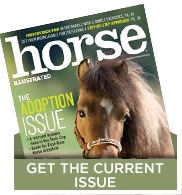There it was on the front page of my local newspaper: a
photo of a tall, bony chestnut mare, found abandoned in a weedy field. It was
unknown how long she’d been there, picking through dandelions and foxtails for sustenance.
She was rescued only because a herd of Herefords had busted through a wire
fence and wandered into the same weed patch. When Riverside County Animal
Control officials came to round up the cattle, they discovered the mare.
to the uniformed agents. They happened to have some spare dog leashes on hand
so they buckled them together to create a makeshift halter, and led the big red
mare into the trailer. She walked right in.
Once they got her back to the county facility, a vet
conducted an exam. By checking her lip tattoo they figured she was a
15-year-old Thoroughbred. Though thin and full of burrs and stickers, it’s
predicted she’ll respond to treatment and either end up being adopted out or
sent to a foster home.
I’m not sure what’s going on with abandoned horses in your
area, but out here it’s rampant. In 2006 my county collected 20 abandoned
horses, meaning they were wandering loose on public land, and once captured
remained unclaimed. This year they’re up to 74. And it’s only mid-September.
There’s no denying that the economy is pushing the plight of
the unwanted horse. Unemployment and home foreclosure statistics in my county
are among the highest in the nation. The first non-essential item that’s put up
for sale is the backyard horse. Problem is, there aren’t many buyers. The financially
solvent folks who are horse shopping are typically looking for high-performance
show horses or so-called Cadillac trail horses. All the mid-level auctions that
functioned as marketplaces for nice family horses have pretty much disappeared.
So when the nice auctions are shuttered and your ads get no response, where do
you turn when you need to get rid of a horse?
Unfortunately, something ugly has happened. There was much
rejoicing a couple of years ago when the equine slaughterhouses in the United
States were closed. Hooray! No more
unwanted horses would be killed in America! But in reality more horses than
ever are being sent to the killers. They’re just being shipped to Canada or
worse, Mexico.
These double-decker transport trucks aren’t magically
filling up on their own. Despite rules, laws and regulations, the knackers have
learned how to work the system. The unwanted horses they’ve plucked from
ranches, low-end auctions and naïve backyard owners simply roam a feedlot for a
while before making the long trek north or south. So all that patting on the
back we did for shutting down the horse slaughter industry in America? A lot of
good that did.
I wish I had an easy solution to the unwanted horse problem
but I don’t. But I have a few suggestions. First, we need to continually
emphasize the high cost of maintaining a horse. It’s not the purchase price
that stuns people, it’s the upkeep. Second, we need to stop breeding so many
horses. The era of producing a few fancy horses for fun and profit are over. Get
a different hobby. Next, we should encourage more horse owners to seek hands-on
advice from professionals. Then, if and when a horse does have to be re-homed,
it’ll be much easier to place than one that’s developed bad habits from poor
riding or was never fully trained in the first place. Finally, we have to be
more candid about humane euthanasia. It is a reasonable option when a horse has
become so aged, ill, lame or unruly that it’s impossible to find it a good
home.
While no one enjoys ending a horse’s life, that has to
become a more acceptable choice than turning it loose in a weedy field to fend
for itself. Whenever I present this idea, though, I often hear the response,
“But it’s so expensive to put a horse down.”
Yes, it is. Out here, the total cost for the vet and removal
of the carcass is about $350. That’s a hefty bill if you’re trying to keep a
roof over your head. Yet I still believe that if we promote responsible horse
ownership potential buyers will begin to plan ahead. They’ll know to set aside
some funds not just for a rainy day, but for a deluge. If we work together I do
believe we can improve the plight of the unwanted horse. If you have any other
ideas or comments, I’d like to hear them. Just click on “Submit a Comment”
below.
Back to Life with Horses





I live in New Mexico. We have been in the midst of a terrible drought; that along with high price of hay, when you can find it,no pasture land and the poor economy has created a large number of unwanted horses. One cannot find a buyer or even give away many of these animals….so a great number are being hauled off to the middle of nowhere and left to die of thirst. Humane slaughter would probably be a much better end to this slow death.
I think that stiffer penalties should be laid upon the racing industry. they are guilty of over breeding and tossing away what they don’t see potential in. Horse racing is the number one culprit in California. And since California is closer to the boarders of Mexico and Canada where horse slaughter is legal should be regulated. Show barns aren’t innocent in this problem.
In our town horses aren’t abandoned much. We have a lot of animal shelters and a lot of horse owners. Sadly, instead of this, a lot of pets are killed by cars. Just last week, a horse named Smarty, a really nice, trusting horse was hit and died later that night.
They get hit when they wander out of their yards.
THANKS FOR ALL THE COMMENTS. I TRULY ENJOY READING THEM!
NANCY, YOU BRING UP A VALID POINT: HUMANE SLAUGHTER MAY INDEED BE A BETTER OPTION THAN JUST ABANDONING A HORSE TO STARVE OR DIE OF THIRST. BUT AT THIS TIME, THE WAY HORSES ARE SLAUGHTERED– MECHANICALLY, IN A PRODUCTION LINE– IS NOT HUMANE. NEITHER IS THE MANNER IN WHICH THEY ARE TRANSPORTED TO THE SLAUGHTER HOUSE.
CONNIE, YOU MENTIONED THE HORSE RACING INDUSTRY… YES, HORSES ARE SEEN TOO OFTEN AS A BY-PRODUCT. YEARS AGO, HORSES OFF THE TRACK WERE SNAPPED UP AS “PROJECT HORSES” FOR ASPIRING HUNTER/JUMPER/DRESSAGE/EVENTING RIDERS. NOWADAYS, EVERYONE WANTS A WARMBLOOD. AS A HUNTER JUDGE, I CAN ATTEST TO THIS. RARELY DO I SEE A NICE TB IN THE HUNTER RING ANYMORE; THEY’RE ALL SOME KIND OF WARMBLOOD OR WB-CROSS. SO WHERE ARE ALL THESE TB’S THAT CAN’T RUN GO? SOME DO GET RE-TRAINED FOR NEW JOBS. MANY GET PUT INTO RESCUE OR ADOPTION FACILITIES. BUT TOO MANY END UP GOING TO SLAUGHTER.
THERE IS A MOVEMENT ON TO COERCE TB OWNERS TO PAY INTO A RETIREMENT FUND, PERHAPS EVEN UPON REGISTERING A FOAL WITH THE JOCKEY CLUB. AND THEN THERE ARE CERTAIN HIGH-PROFILE TRAINERS WHO OPENLY SUPPORT FINDING SECOND CAREERS AND RETIREMENT HOMES FOR THEIR EX-RACERS. BUT FOR THOUSANDS OF OTHER THOROUGHBREDS, THEIR LIFE HAS BUT ONE SAD ENDING.
PLEASE KEEP SUBMITTING YOUR COMMENTS. I READ THEM ALL!
There has got to be a better way — Here in Ny I don’t hear of abandoned horses — BUT the horse auctions are quite common and the meat buyers leave with hundreds of horses. It is terrible. we have many rescue groups, who try to buy a few each time and save them- but they can only save so many- If I could, I would save them all- I already have 4 horses and only 3 stalls. There is a web site out of NJ – camelot auction where a group of people take photos of the horses in the meat buyers pen and post them- they have worked a deal with the buyer to let them find homes for the horses for 50$ more than he paid for them– It breaks my heart every time I see them… In a perfect world we would all be responsible horse lovers……I can’t understand those that aren’t. My horses always eat before I do and their stalls are cleanier than my house..(ask my non horsey husband–lol) we each need to do the best we can and support the rescues that are out there – instead of breeding more horses- check out a rescue website —–
VERY gr8 article! at the stable where i work, there is an old blind mare that nobaody pays any attention to and another half-blind on that nobody rides either. they just sit in thier stalls, wasting hay and wasting away themselves!! i pity them soooo bad! and yes people should STOP breeding thier horses so much!!! my older friend has at least 4 babies each year, but there’s always willing buyers.(?)yes i’t’s gr8 that the slaughter has stopped, but dont you think that if we at least transport them humanely and kindly then it would be better then getting shipped farthe to mexico and canada……..those are my opions.
It’s just horrible what the horses have to go through because humans decide that ‘more is better.’ Warmbloods have pushed Thoroughbreds out of potentially good homes. Stock horse breeders are breeding multiple babies from one mare a year with embryo transfer. The racing industry is still breeding too much quantity and not enough quality in the horses and it winds up hurting the horses in the end. If, after a certian amount of time I could not find a good home for a horse I would bite the bullet and have the horse put down, I’d rather spend several hundred dollars to have peace of mind than to think the horse would wind up as dinner in a foriegn country.
Excellent blog, Cindy, especially on a difficult issue to address. I admit to being very conflicted about the subject. Apologies in advance for the length of what follows.
**If** slaughter were humane for horses, I would probably be less against it. But it is not. From transporting to ill-fitting cattle halters to the run-through chutes to the kill floor, none of it is “designed” for horses; it’s designed for slower-moving animals who have had far less contact with humans.
We owe better to our horses.
Humane euthanasia can and should be made more affordable, along with disposal. So-called low-cost euthanasia clinics have been held with success; there should be more, perhaps under the auspices of city/county animal control.
Laws forbidding transporting out of state (which is on the books in California) or out of the country (which is before Congress) are useless without enforcement. Many of us thought that when the European Union and Asia began forbidding meat from animals that had been given Bute and other medications, the market for U.S. horse meat would dry up. But it’s clear none of the horses — alive or dead — are being tested, since pretty much every horse has, at some time in its life, been dewormed, vaccinated, had Bute or any number of other drugs on the banned list.
Registries should STOP rewarding people for breeding more horses. The AQHA is the leader of that pack, handing out incentives to its biggest breeders right and left. The more heinous sin on the AQHA’s part is being perhaps the most PRO slaughter registry in the world, the “leadership’s” opinion being how else will all those breeders producing hundreds of foals a year be able to get rid of their culls?
That’s an unspeakable attitude.
While the Thoroughbred breeders and owners are not guilt-free, at least the Jockey Club and the tracks themselves are trying to help the horses.
The Jockey Club has Thoroughbred Connect, where owners can find second homes for their retiring horses; breeders, owners and trainers can place stickers and other notifications on a horse’s papers to help ensure it “comes home” after its racing days; there are dozens and dozens of industry-supported retraining, rehoming and retirement programs; many tracks now expressly forbid and will ban owners and trainers who sell horses for slaughter; several states now take out a small, set percentage from bets and purses to support TB retirement programs.
So while the TB world is not perfect, it does far, far more for its horses than the AQHA, Paint, Arabian, Appaloosa, Standardbred … well, you get the idea … registries do for theirs.
It’s on all of us to do more, do better. People need to stop breeding low-quality horses. They need to give the horses they do have A JOB. They need to get training on their horses so they have a use other than filling a dinner plate in France.
this was very good, and i found it the best because it has a easygoing opinion that is not offending to some people. well written.
I REALLY APPRECIATE THE TIME AND THOUGHT THAT WENT INTO ALL THESE COMMENTS. OBVIOUSLY THIS IS A TOPIC THAT NEEDS TO BE DISCUSSED REPEATEDLY.
VERONICA, YOU PRESENTED SEVERAL SIDES AND VIEWPOINTS OF THE SLAUGHTER ISSUE. AS YOU POINT OUT, SOME BREED ASSOCIATIONS SEEM TO REWARD BREEDING MORE AND MORE HORSES. THEY THEN PROFIT OFF THE REGISTRATION FEES OF THOSE FOALS. NEEDLESS TO SAY, THERE AREN’T HOMES FOR ALL OF THESE HORSES; ESPECIALLY NOT IN THIS ECONOMY.
This was a great article!